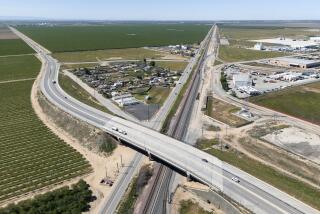Some firms move jobs ‘onshore’
- Share via
CORSICANA, TEXAS — Gary Richardson left this boomtown-gone-bust in 1996 for a computer job in Dallas, the big city 60 miles north.
“I didn’t think I would ever come back,” Richardson recalled recently, “because there were no jobs like mine here.”
Not until this year, when Northrop Grumman Corp. opened an information technology center in town and began recruiting IT specialists and software engineers.
In a twist on offshoring that Northrop has dubbed onshoring, the global defense and technology corporation has been shipping computer work to small-town America, shunning India’s Bangalore and Mumbai.
Century City-based Northrop picked Corsicana and six other small cities, including Lebanon, Va., and Helena, Mont., as locations for employees who develop software and troubleshoot technical problems for clients hundreds or thousands of miles away.
It costs Northrop about 40% less to have the work done in Corsicana than in Los Angeles -- savings similar to what would be achieved by sending jobs overseas.
“We’re getting very high quality and a dedicated workforce,” said Thomas Shelman, president of Northrop’s Information Technology Defense Group and creator of the company’s onshoring program.
Onshoring, in fact, is becoming trendy.
Some U.S. companies have recently pulled back from India to set up shop in rural areas where access to high-speed broadband connections isn’t the problem it was just a few years ago, and where lower real-estate prices and wages are attractive.
Xpanxion, an Atlanta-based software developer, relocated its test operations to Kearney, Neb., from Pune, India, because the time difference was hampering communications.
Computer maker Dell Inc., once at the forefront of outsourcing to foreign countries, opened a technical support center in Twin Falls, Idaho, after customers complained about overseas workers’ English-language skills.
Accenture, the world’s largest consulting firm, is building a document-processing center on an Umatilla Indian reservation in Oregon.
“We’re responding to the tremendous demand among Accenture clients for outsourcing services performed by professionals within the U.S.,” Randy Willis, a senior Accenture executive, said when the project was announced last fall.
A few companies based in India are turning outsourcing on its head too. Wipro Technologies, a software maker based in Bangalore, is establishing a design center in Atlanta that could employ about 500 computer programmers.
“The work we’re doing requires more and more knowledge of the customers’ businesses -- and you want local people to do that,” Wipro President P.R. Chandrasekar said in a recent statement.
It’s not that offshoring isn’t popular in corporate America anymore.
A survey of more than 500 large U.S. companies last year by consulting firm Booz Allen Hamilton found that 60% had shipped some work to other countries. Another firm, Forrester Research, predicted that about 3 million high-tech jobs would head overseas by 2015.
But Dan Sernett, a partner in Los Angeles with Ernst & Young, a professional advisory firm, said many companies were reassessing offshoring. “It’s not a slam dunk as it was several years ago,” he said. “They’re looking for alternatives closer to home.”
Northrop would rather stay home, in part because so many of its government contracts are for national security projects. The company hires 5,000 software engineers every year, and putting some of them in its new small-town centers could save at least $15 million annually in payroll costs. The plan is to have 50 such centers around the country.
The starting salary for a software engineer with one year’s experience is about $42,000 a year in Corsicana and $56,000 in Los Angeles or McLean, Va., the Washington suburb where Northrop’s IT operations are based.
One reason: A three-bedroom home in Corsicana sells for about $125,000, compared with about $700,000 for a similar place in L.A.
For communities such as Corsicana, white-collar jobs are seen as a way to elevate and diversify a local economy that has long been dominated by low-wage, blue-collar work.
“It’s not something people are used to seeing around here,” said Kevin Culpepper, a systems engineer and native of nearby Ennis, Texas, who returned to the area to manage the new center after having worked in Dallas.
Corsicana’s heyday came in 1894 when drillers digging for water accidentally hit black gold and transformed the once-sleepy trading post into the first oil boomtown in Texas, with more millionaires than anywhere else in the state.
Most of the wells have dried up, fast-food restaurants have replaced oil derricks, and the city has struggled to survive with a quarter of its population living in poverty. Its claim to fame these days is fruitcake maker Collin Street Bakery and the Pearce Civil War Museum, which has one of the largest collections of letters written during the conflict.
“We’ve basically been stagnant,” said Lee McCleary, the town’s economic development director.
In recent months, locals have begun talking about the possibility of another boom bubbling to the surface -- this time from the nearly empty shopping mall where Northrop has set up its work site.
Enticed by the potential for a new pool of middle-class buyers, developers are talking about building 200 homes -- the kind of large-scale construction that hasn’t happened in Corsicana since the oil boom.
“That’s significant for us,” McCleary said, noting that the presence of Northrop has prompted other high-tech companies to consider opening offices in town. “It’s taken us to another level in types of industry we can recruit.”
Richardson, who left Corsicana for a job in Dallas, returned in March when he was hired at the center as a software developer.
“I jumped at the chance to come back,” he said. In Dallas, his workday commute was 90 minutes each way. In Corsicana, his drive takes about 10 minutes -- through two traffic lights and two stop signs.
Nancy Boone, 58, a homemaker who has raised four children and wants to get back into the workforce, has been taking computer courses online in a special program at a local community college.
The 10-month crash course was created to retrain local residents to work at the Northrop center.
“It’s ideal for my situation,” Boone said as she logged off her computer on a makeshift desk in her kitchen. “It’s what I’ve always dreamed of.”
More to Read
Inside the business of entertainment
The Wide Shot brings you news, analysis and insights on everything from streaming wars to production — and what it all means for the future.
You may occasionally receive promotional content from the Los Angeles Times.










